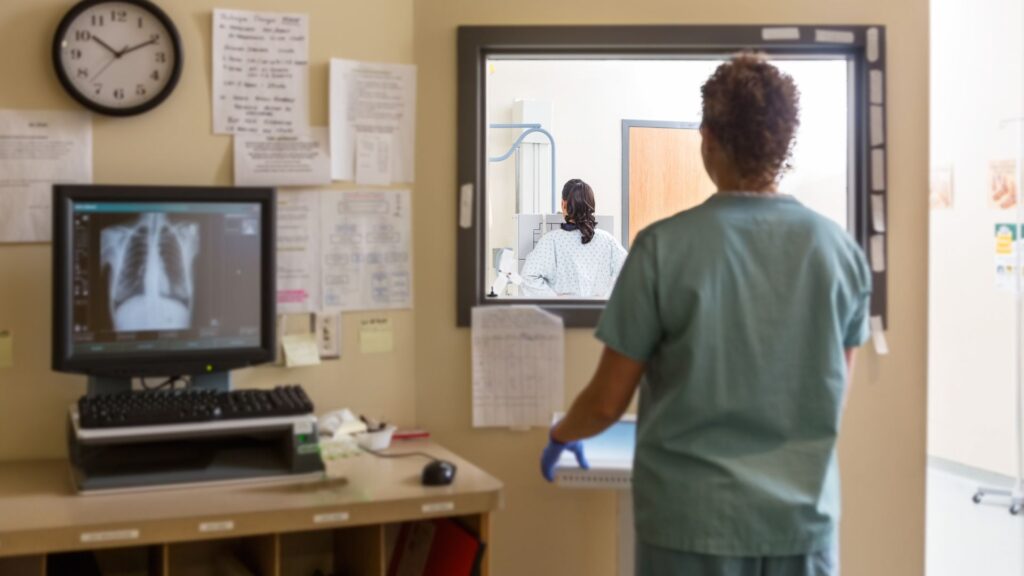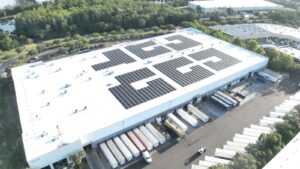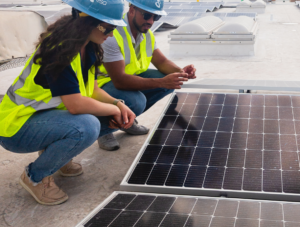Hospitals are essential institutions that provide care, treatment, and support to patients in need. However, these facilities also consume a significant amount of energy to sustain their operations. With the growing concern for sustainable energy practices and reducing carbon footprints, hospitals can now adopt renewable energy sources with Solar Panels For Hospitals.
Solar panels for healthcare facilities not only reduce dependence on traditional sources but also offer numerous benefits such as cost savings, a reliable backup power source, and environmental conservation. In this blog post, we explore how ESA can support hospitals seeking a renewable energy solution and revolutionize the healthcare industry.
Why Should Hospitals Go Solar?
Healthcare is a heavily regulated field. Clinic and laboratory systems use electricity as lighting devices, refrigeration equipment, and other important operations. This large energy requirement can have three main consequences:
- Unacceptable power bill!
- Emission of large quantities of CO2 in the atmosphere.
- Power interruptions are a no-go
Increasing solar energy is helping hospitals minimize these risks. Producing their own energy for distribution and selling excess energy will assist healthcare organizations to cut their monthly energy costs dramatically. Solar energy has a positive environmental value and does not emit greenhouse gases.

Benefits of Solar Panels For Hospitals
Solar power is a clean and renewable energy source for healthcare facilities. Adopting solar technology in healthcare facilities offers various advantages such as cost savings, environmental conservation, and improved quality of life within the healthcare facility premises.
One of the primary benefits of solar panels for hospitals is cost savings. Electricity bills account for a significant portion of hospital expenses, and solar power can help reduce these costs significantly.
In addition to financial benefits, solar installations at hospitals also contribute to environmental sustainability and conservation. By using renewable energy sources like solar power, healthcare facilities can reduce their carbon footprint and promote sustainable practices.
Moreover, strategic placement of solar panels can also provide shade and insulation to buildings, which helps regulate indoor temperatures during extreme weather conditions. This not only reduces energy consumption but also provides comfortable living spaces for patients and staff members alike.
Solar Installations at hospitals provide an excellent opportunity for healthcare organizations seeking sustainable solutions that reduce operating costs while maintaining the power supply for critical operations during blackouts or natural disasters.
Cost of Solar Installations For Hospitals
Hospitals are energy-intensive facilities that operate 24/7, and as a result, they require highly reliable and efficient power sources. Solar energy systems at hospitals have emerged as a viable solution to meet the ever-increasing energy needs of these medical facilities while reducing their carbon footprint.
Solar panels can be installed on rooftops, parking lots, or unused land to generate clean electricity for use within the hospital. Hospitals can also install solar hot water systems to meet their hot water demand. The installation process involves identifying suitable locations for panel placement, conducting feasibility studies, and designing an optimal solar system, size, and configuration based on energy demand patterns.
Another way of installing solar power for hospitals is the construction of solar carports on parking lots and garages. Solar car parking areas provide a safe environment to shade parked vehicles and also produce electric power for healthcare facilities.
With rising utility rates and volatile fossil fuel prices, investing in solar power ensures predictable electricity costs for many years into the future. Additionally, installing solar panels demonstrates a hospital’s commitment to sustainability and environmental stewardship.
Strategic Placements with Solar Panels For Hospitals
When it comes to installing solar panels at hospitals, strategic placements are key. The location of the panels can make a significant difference in their overall effectiveness and efficiency.
One important factor we will first determine is the best location for the panels to receive optimal sunlight. In most cases, positioning them facing south will ensure maximum sun exposure throughout the day.
Another consideration is finding areas with little shading from nearby buildings or trees that could block sunlight. It’s also important to consider any potential obstructions such critical equipment such as AC units or vents that may interfere with panel placement.
Installing solar panels on rooftops is a common strategy for healthcare organizations, but ground-mounted solar systems also are also an option if there isn’t enough space on the roof. Ground installations require additional considerations such as proper anchoring and security measures.
Careful planning and attention to detail when placing solar panels at hospitals can lead to greater energy savings and a more sustainable future for healthcare facilities.

Solutions for Healthcare Organizations
Healthcare organizations have a significant role to play in the transition toward renewable energy. One of the main solutions is investing in solar power systems. Solar panels for healthcare can help reduce electricity bills and carbon footprint, while also providing backup and reliable power supply even during emergencies.
One solution is through Power Purchase Agreements (PPA) where hospitals lease their roof space to solar installation companies, who then install and maintain the solar panels. Healthcare facilities don’t have any upfront costs with PPAs and still benefit from lower energy bills.
Another solution is installing battery storage systems along with solar panels that store excess energy generated during daylight hours. This stored energy can be used at night or during high-demand periods when utility rates are higher, reducing reliance on traditional grid electricity.
It’s important for healthcare organizations to evaluate their current energy usage patterns and identify areas where they can improve their energy efficiency, before implementing any solutions. Hospitals should also consider working with our experienced team at ESA to custom-design their healthcare facility PV system. While many solar installation companies may install solar projects, few specialize in designing customized solar systems tailored to meet specific healthcare facility needs.
By taking advantage of these solutions, healthcare organizations can not only decrease operational costs but also contribute significantly towards sustainable development goals by reducing greenhouse gas emissions and promoting environmental conservation efforts.
Ways Solar Panels for Hospitals Can Conserve With Solar Energy
It’s no surprise that Hospitals are one of the largest consumers of energy, and solar technology has proven to be a cost-effective solution for them. Here are some ways hospitals conserve with their solar energy systems:
- Reduced energy bills: Solar panels generate electricity that powers hospital equipment, reducing their dependence on the grid. With lower electricity bills, hospitals can allocate more funds toward patient care.
- Increased resilience: Hospitals need a constant supply of power to operate efficiently. Solar panels provide backup power during blackouts or brownouts, ensuring uninterrupted medical services.
- Lower carbon footprint: Traditional methods of generating electricity release greenhouse gases into the atmosphere, contributing to climate change. By using solar panels, hospitals reduce their carbon emissions and contribute towards a greener future.
- Community engagement: Hospitals often serve as community hubs and leaders in health initiatives. By installing solar panels, they set an example for other organizations to follow and promote renewable energy use within local communities.
Incorporating solar technology into healthcare facilities not only benefits the environment but also improves patient care by reducing costs and increasing operational efficiency during emergencies or natural disasters.
Challenges and Opportunities
When it comes to implementing solar panels in hospitals, there are several challenges and opportunities that come with it. One of the biggest challenges is the initial investment required for installation as well as ongoing maintenance costs. However, this can be offset by significant long-term savings on energy bills.
Another challenge is finding suitable locations for panel placement, especially in urban areas where space may be limited. Hospitals also need to consider their energy needs and ensure that the solar panels installed will meet those requirements while also complying with local regulations.
While there are certainly some roadblocks when it comes to implementing solar projects at healthcare facilities, the potential benefits far outweigh any challenges faced along the way. As technology continues to improve and costs decrease over time we expect this trend only continue upwards!

The Future Of Solar and Healthcare Facilities
The healthcare industry is constantly evolving and seeking innovative ways to improve patient care while having less environmental impact and reducing costs. As the world becomes increasingly energy-conscious, solar power has emerged as a promising solution for hospitals looking to reduce their carbon footprint and save on electricity expenses.
Going forward, we can expect to see more healthcare facilities turn to solar panels for their own energy supply needs. With advancements in technology, solar panels are becoming more efficient and cost-effective than ever before.
In addition, there will likely be increased collaboration between the healthcare industry and renewable energy companies. This could result in custom-designed solar panel systems tailored specifically for hospital settings. Click here to view our case study on our project with Advent Health in Orlando Florida.
Moreover, we may also see an increase in government incentives aimed at encouraging hospitals to switch to renewable energy sources such as solar power. These incentives could include tax credits or grants that help cover the initial investment required for installing new solar panel systems.
It’s clear that the future of solar power in the healthcare industry looks bright. As concerns about climate change continue to grow, we can expect more hospitals around the world to embrace the sustainable energy solutions that ESA provides – ultimately leading us toward a greener and healthier planet for generations to come.











